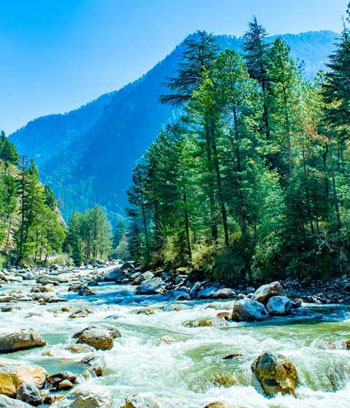
Himachal Package
“The Himalayas are,” says a Western writer Macintyre, in Attack on Everest “the supreme mountains of the earth tossed high in some convulsion of the primal rage, and stricken immobile, a frozen ocean of lava waves whose crests are on the outer fringes of space, whose depths and hollows are the secret places of the earth unknown and inaccessible rock-cut gorges set about by forest swamp and interlocking jungle, within whose grim recesses life may pullulate shut off forever from the outer world, Himalaya the abode of snow. At least 40 heights exceed 24,000 feet. This mountain continent makes its variations of climate from the coldest, aimless arid heights to dark, seamy sunless deeps, glaciers whence torrents run through caverns, measureless to man, down to the sun-parched plains of India. Here the Ganges, the Indus, the Brahmaputra, and the Alakananda burst smitten from the bound rock to wind a hundred miles, through hidden valleys, subterranean gorges, and leagues of treacherous Tarai marsh to spread their healing water on the plains and so to find the ocean and the end of all things, re-absorption in the infinite, re-incarnation and rebirth – the very symbol of the pantheistic cults, that give them adoration.”
Himachal Pradesh, charmingly situated in the lap of the Himalayas, has Jammu and Kashmir to its north, Uttar Pradesh in the south-east, Haryana in the south, and Punjab in the west. Tibet runs along its eastern boundary. Quiet lakes, valleys of flowers, stretches of snow never ceasing to glisten or shimmer, forests rich with wildlife, and rivers of legendary antiquity—Chandrabhaga, Ravi, Bipasha, Shatadrau, and the Yamuna—are some of the features of this state.
Consisting of 12 districts with a population of 68.65 lacs, Himachal Pradesh, before 1947 was divided into 30 small feudatory states. Although they were united by strong general traits, each state had its own cultural and sociological peculiarities. Such picturesque differences can be marked and enjoyed to this day. Besides, geographical factors give many places some marked characteristics too. For example, the people of Chamba live at a high altitude: in small hamlets and each hamlet had become more or less a self-sufficient unit.
An unusual marriage custom prevails in a part of the Kinnaur district. A young man would ‘forcibly’ carry away a girl to his own house. Immediately his father would send two of his friends to the girl’s guardians profusely apologizing for his son’s conduct. The girl’s guardians, of course, would show great resentment but would ultimately be won over and agree to accept some money. The girl, who had become a bride, would then be brought home along with the bridegroom and sent back with gifts. Of the many deities worshipped in Himachal Pradesh, Krishna, Shiva, and Parvati are the foremost. Krishna is the popular theme of the Kangra School of Painting.
Get answers and advices from Professional Tour Consultants.

Contact No.
+91-8587983942

Our Email
info@champarantravels.com
